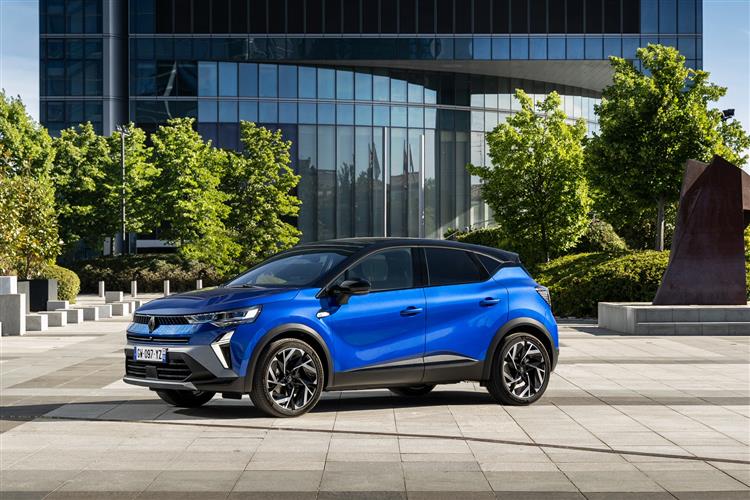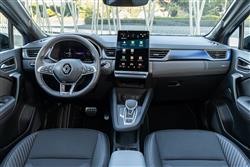BRIGHT SPARK (some text hidden) --NONE--
By Jonathan Crouch
With self-charging hybrid tech, an electrified version of Renault's now-improved Captur small SUV makes plenty of sense, thinks Jonathan Crouch
Ten Second Reviewword count: 40
The most frugal version of Renault's Captur small SUV is this self-charging E-Tech full hybrid 145 variant. You can't plug it in, but there's decent value pricing to compensate, a sharp new look and a real-world-achievable set of efficiency stats.
Backgroundword count: 126
Almost un-noticed was Renault's decision at the end of 2020 to dump all the dCi diesel versions of its Captur small SUV in preparation for the launch of this model, the Captur E-Tech Hybrid 145. Unlike its PHEV stablemate (since dropped), this self-charging HEV model sells for diesel variant money and will cost a lot less than a black pump-fuelled small SUV to tax. While delivering very similar fuel and CO2 efficiency figures. Advantages over PHEV rivals include a huge price saving and a large boot. We suspect that this light HEV crossover might sometimes be more frugal to run in the real world too. And you don't have the hassle of having to continually plug it in. Here, we look at the usefully updated version.
Driving Experienceword count: 327
Here, Captur customers are offered a 'self-charging' full-Hybrid unit like that in rival Toyota C-HR, Nissan Juke, Kia Niro or Hyundai Kona Hybrid small SUV models. So it can, for very short periods, run independently on full-electric power (unlike the 'mild hybrid' engines you'll now find in quite a few of this car's small SUV rivals). Renault makes much of the way the design of this car's engine borrows from its F1 racing technology. Like the brand's racing powerplant, this one is extremely compact and features two electric motors, one with 36kW on the rear of the gearbox and one with 15kW on top of the transmission, along with a four-cylinder 1.6-litre normally aspirated petrol engine which contributes most to the 145hp total output. The gearbox is an auto of course (but of the more unusual 'dog box' clutchless variety) and the motor is powered by 1.2 kWh lithium-ion battery pack located beneath the boot floor. The rest of the drivetrain has somehow been shoehorned beneath the bonnet. There's plenty of mid-range pulling power, so plenty of scope for enthusiastic progress here, particularly if you select the most dynamic of the three drive modes on offer - 'Sport'. But you're not going to want to use that too often for fear of decimating the frugal fuel returns which would have prompted you to choose this car in the first place. For the best readings, you'll most of the time want to stay in 'MySense', a hybrid setting which blends the petrol and electric motor output for maximum economy. In town, you might want to select the 'Pure' mode (or the 'EV' button on the centre console) which prioritises battery-electric drive up to about 38mph, providing there's sufficient charge. Renault claims that a Captur E-Tech Hybrid will be able to travel for 80 per cent of urban journeys on battery power alone. There's also a further 'Brake' setting on the gear lever, which increases throttle lift-off electrical regeneration.
To see the full road test text contact us on 0330 0020 227
Pictures (high res disabled)

.jpg)
|
.jpg)
|
.jpg)
| |||
.jpg)
|
.jpg)
|
.jpg)
| |||

|
Statistics (subset of data only)
Min |
Max |
|
Price: |
£24,595.00 (At 4 Jun 2021) |
£27,995.00 (At 4 Jun 2021) |
CO2 (g/km): |
114 |
|
Max Speed (mph): |
106 |
|
0-62 mph (s): |
10.6 |
|
Combined Mpg: |
60.1 (WLTP) |
|
Length (mm): |
4227 |
|
Width (mm): |
1797 |
|
Height (mm): |
1576 |
|
Boot Capacity (l): |
326 |
|
Power (ps): |
145 |
|
Scoring (subset of scores)
Category: Hybrid, Plug-in, Electric & Hydrogen
| Performance | |
| Handling | |
| Comfort | |
| Space | |
| Styling, Build, Value, Equipment, Depreciation, Handling, Insurance and Total scores are available with our full data feed. | |



